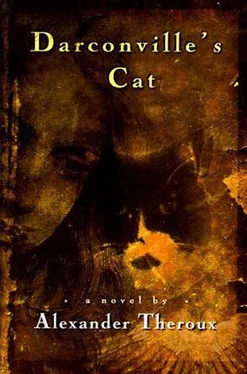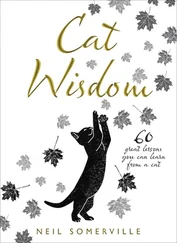That was a fair question, for if Quinsyburg had a wealth of anything it was certainly time, and, beyond that — as the handbook so sagely put it — didn’t sloth, like rust, consume faster than labor wears, with the key that’s often used remaining always bright?
The girls in that little gradus, if they paid attention, had their rules for life. The most trifling actions, they were reminded, if good, increased their credit but if bad became a matter, when done, no apology could rectify. They were not to fork for bread, dry their underpinnings by the fire, leave lip-prints on drinking glasses, touch the teeth with the tines of a fork, use rampant witticism, stipple the shower stalls, nor effect shadowgraphs with the fingers at the Saturday movie, neither were they ever to thrust out the tongue, sigh aloud, gape, swap underwear, eat fish with the knife, use French words as that is apt to grow fatiguing, nor cultivate mimicry which was the favorite amusement of little minds. They must never strike out wantonly nor snip their nails in public, neither hawk, spit, sniff, crack fleas nor drum their fingers. They were asked not to jerk their hair out of their eyes nor sip audibly nor effect the branch of a tree for walking purposes nor indicate assent or dissent by motions of the head, as was the wont of Northern girls. Neither must they spit on their irons, crunch on cracknels, use primroses for floral decoration, say rude things like “Stir your stumps!” or “Tarnation!” or mutter anything whatsoever disrespectful about the universe. In sharply turning a corner, coming suddenly in contact with another, they had already abused a right. They were not to whistle, toast cheese in their rooms, make memorandum knots in their handkerchiefs, wangle their fingers during conversation, or indulge in parades of learning, for they would surely live to see verified that a woman who is negligent at twenty will be a sloven at forty, intolerable at fifty, and at sixty a hopeless mental case. To flee affectation and to be circumspect that she offend no gentleman caller in her jesting and taunting, to appear thereby of a ready wit, was, above all, paramount.
There was, of course, this business of young men, a matter nearest their hearts because most agreeable to their ambitions, for a Southern girl without a man was like a pushwainling without wheels. Southern boys, superintended parent and patron alike, must be polished at all points and trained correctly lest they flag in those battles for which they were now in the very preparation, whether against the enemy agents of this country or in behalf of Southern ideals, of which the girls at Quinsy College, and like schools, were the most charming synecdoche, and while there was a generous plenty — an epidemic, in fact — of prep schools and Presbyterian colleges all over Virginia, anti-intellectual rest homes which taught overadvantaged quidnuncs how to wear rep ties and smile, the closest parallel to the female academy, juxtaposing chivalry with charm, was the military academy.
Virginia is famous for its many military academies. All, in point of fact, are one. It is at best a technique mine of Prussian fanaticism, an encampment of stibnite-colored barracks and halls sticking up dolefully in the middle of acres of castrate lawns, and, as advertised, usually in the rearward pages of national magazines — always showing either a little chevalier midway over a baffle or some lost, disappointed boy, too old for his age, staring out in parade dress — it is invariably named something like Stirrup-and-Halter Hall or St. Bugle’s Academy or Furlongville and run by a man called Colonel Forksplit, a vole-eyed martinet with a back straight as a Hepplewhite chair and a mouthful of sententious stories, all lies, about Stonewall Jackson’s boyhood. His charges — you can always see them standing alone, glum, in the Washington, D.C. bus terminals after holidays — must adhere to the regimental uniform which is nothing more than a bit of jerry jingle stolen from the Yeomen of the Guard. But uniforms have plenty of buttons, and Southern girls, whose adoration for uniforms must be listed, after amour-propre , as the most pronounced regional hobble against the First Commandment, always hold you by the button when they speak to you.
Were Quinsy girls, then, familiarized with all the social graces, schooled to realize that by a failure of either fashion or forthputfulness it might very well cost them an M.R.S. degree?
The handbook, encouraging power without aggression, covered all contingencies. The caveats were long and letter-perfect. They were never to dip sippets, lap stamps, or chew gum, and upon the occasion of being invited to dine out to wear dotted Swiss, eat little, and remember that one variety of meat and one kind of vegetable was the maximum. At least one half of the fare, a sop of grace to gluttony, must be left in the plate. They were told that game bones must never be lifted to the mouth nor strenuously attacked, scraped, or twirled. They were always to use palliatives when giving opinions of consequence and yet, at the same time, encouraged to shape the gentlemen callers who were over-saucy with them, or who had small respect in their talk, such an answer that they may well understand they were offended with them, not so sharply, however, that the escort be irrevocably turned away. They were asked not to crake or boast, not to use any fond sauciness or presumption but, if dancing, say, to dance well without over-nimble footings or too busy tricks — and it was advised they neither reverse in waltzing nor dip.
Curtseying was encouraged, as long as every girl remembered that there have been many women who have owed their ruin to an awkward attempt at such. She was counseled against shingling the hair, sipping audibly, effecting a need in public for toilet facilities, and always, in instance without number, to take heed that she give none the occasion to make ill report of her, whereupon, for example, if she went riding, she must never ride astride, whoop untowardly, or button the third button of the hacking jacket. The carriage of a young lady must, at all times, be respectful without meanness, easy without familiarity, genteel without affectation, and insinuating without design. Finally, they were asked not to speak of themselves, for nothing could ever be said to varnish one’s defects nor add luster to one’s virtues, whereas, on the contrary, it would only make the former more visible and the latter more obscure. She who lived upon talk would die fasting. Good manners will minister to the shop, and the shop will minister to thee. “Industry,” as Stonewall Jackson once precociously lisped to his mother from his bassinet, “needs not wish.”
Quinsy College would not only endure, but prevail. It had before in times of trial and would again. Its policies, fashioned out of an impatience with this new age of permissiveness, said it all, with this hope expressed, this continuity dearly wished, that in such schools — with the laws of both discipline and decorum meted out by the best teachers of bienséance —there would surely be an eventual return to the good old American Way. Had times changed? They had, yes, they had indeed, but if President Greatracks himself, as he so often said, had to patrol the campus by night in specially made sneakers snooping for socialists, so be it! Had customs changed? They had, yes, but if one could no longer catch a glimpse, as in days of yore, of Southern belles holding parasols, wearing frilled bonnets, and tripping across lawns in fragile blue-and-white prints with handkerchief-pointed tiers of feminine chiffon and cascades of quivering ruffles, it didn’t matter — they were still worshipfully kept alive in the rotogravure section of every true Virginian’s heart. Had laxity set in? Yes, yes, yes, laxity, slackness, looseness! It was the age. But if ideals were honored more in the breach than in the observance nowadays, it took nothing more than a quick look up at the college rotunda to have one’s faith restored, for there the flag still flew. The American flag, sir!
Читать дальше












